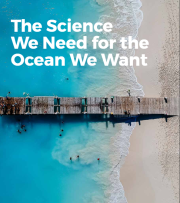24 April 2017—Emergency measures to respond to threats such as marine micro-plastics and the establishment of a regional ocean oxygen network were among the highlights of the 11th Intergovernmental Session of the IOC Sub-Commission for the Western Pacific (WESTPAC-XI).
About 100 delegates and representatives from 15 Member States as well as partners in the region gathered in Qingdao, China from 21-23 April for the biennial meeting.
The WESTPAC session brings together representatives from relevant government agencies and members of the scientific community to ensure that science better informs policy as well as to advance international cooperation on marine science, observations and service. This year the session focused strongly on improving institutional capacity to deal with challenge as the region pursues the 2030 Agenda for Sustainable Development.
The meeting reviewed the development of the IOC in the context of international frameworks, including the UNESCO Program and Budget for 2018-2019; the 2030 Agenda for Sustainable Development and Sustainable Development Goal 14 on oceans; Biological Diversity Beyond Areas of National Jurisdiction (BBNJ); and the proposed International Decade of Ocean Science for Sustainable Development (2020-2030). WESTPAC aims to serve a strategic link in this regard between IOC global objectives and national-level programmes and actions.
The Sub-Commission emphasized the pivotal role of WESTPAC in the implementation of the IOC’s Capacity Development Strategy (2015-2021), and reiterated the importance of its “inclusive, adaptive and self-driven” approach to capacity development in the region.
In this regard, WESTPAC identified immediate measures to enhance its efficiency, effectiveness and visibility of all programmes structured around four thematic areas: (1) Understanding Ocean Processes and Climate in the Indo-Pacific; (2) Ensuring Marine Biodiversity, Food Safety and Security; (3) Maintenance of Ocean Health; and (4) Enhancing Knowledge of Cross-cutting and Emerging Issues.
A signing ceremony was also held at the meeting between UNESCO/IOC and the Indonesian Institute of Sciences to mark the establishment of a Regional Training and Research Centre on Marine Biodiversity and Ecosystem Health (RTRC-MarBEST). WESTPAC officials expressed their appreciation for the government of Indonesia’s strong commitment to enhancing national and regional capacity for marine biodiversity conservation and safeguarding ecosystem health.
Regional programmes to deal with critical threats posed by marine microplastics and harmful types of jellyfish were established at the meeting as were two regional working groups to advance an ocean oxygen network (WESTPAC O2NE) as well as one focusing on energy and materials exchange between land and open ocean in the Western Pacific marginal seas.
The Sub-Commission adopted a US$10-million programme and budget for May 2017-May 2019, with the understanding that this would be used mainly as a reference point on the activities that Member States would like to jointly promote. Funding from various sources will then be sought for their implementation. Roughly only $80,000 has been secured from the IOC Regular Budget for 2018-2019, which indicates that almost all activities of the Sub-Commission from May 2017-May 2019 will have to be carried out via extra-budgetary support from Member States, either through direct financial contributions or in-kind.
The Sub-Commission elected, by acclamation, Dr Vo Si Tuan from Viet Nam to serve as Chairperson for the next intersessional period, while Dr Fangli Qiao from China, Dr Kentaro Ando from Japan, and Dr Zainal Arifin from Indonesia will serve as Vice-Chairpersons. Finally, the Sub-Commission accepted the offers of Philippines and Indonesia to host the 12th Session in 2019 and 13th Session in 2021, respectively.
WESTPAC-XI was convened immediately after the four-day 10th WESTPAC International Scientific Conference, which attracted immense interest from marine scientists within and outside the region. More than 700 participants from 25 countries participated in the conference, the largest marine science event in the region. The next WESTPAC International Scientific Conference has been scheduled for 2020 in Indonesia.




